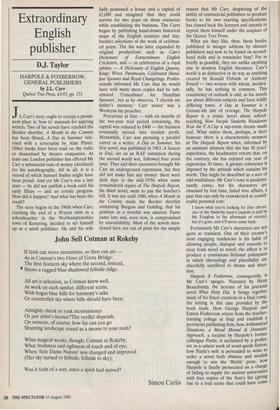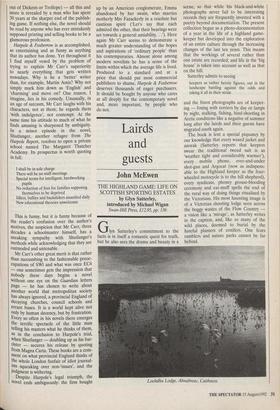Extraordinary English publisher
D.J. Taylor
HAR.POLE & FOXBERROW, GENERAL PUBLISHERS by J.L. Carr Quince Tree Press, £4.95, pp. 155 J.L.Carr's story ought to occupy a promi- nent place in 'how to' manuals for aspiring writers. Two of his novels have reached the Booker shortlist. A Month in the Country has been filmed, A Day in Summer tele- vised with a screenplay by Alan Plater. Other books have been read on the radio or dramatised by theatre companies. At least one London publisher has offered Mr Carr a substantial sum of money (declined) for his autobiography. All in all, it is a record of which Samuel Smiles might have been proud. And yet Mr Carr's was a late start — he did not publish a book until his early fifties — and an erratic progress. How did it happen? And what has been the result?
The story begins in the 1960s when Carr, reaching the end of a 30-year stint as a schoolteacher in the Northamptonshire town of Kettering, decided to set himself up as a small publisher. He and his wife
Sally possessed a house and a capital of £1,600 and imagined that they could survive for two years on these resOurces while establishing the business. The Carrs began by publishing hand-drawn historical maps of the English counties and tiny, booklet selections of the work of celebrat- ed poets. The list was later expanded by original productions such as Carr's Dictionary of Extraordinary English Cricketers, and — in celebration of a royal jubilee — A Dictionary of English Queens, Kings' Wives, Paramours, Celebrated Hand- fast Spouses and Royal Changelings. Profes- sionals informed Mr Carr that he would have sold many more copies had he sub- stituted 'Concubines' for `Handfast Spouses', but as he observes, 'I cherish my father's memory.' Carr senior was a Wesleyan lay preacher.
Precarious at first — with six months of the two-year trial period remaining, the capital was reduced to £400 — the business eventually moved into modest profit. Meanwhile, Carr was pursuing a parallel career as a writer. A Day in Summer, his first novel, was published in 1963. A Season in Sinji, set on an RAF outstation during the second world war, followed four years later. They and their successors brought Mr Carr an underground reputation, but they did not make him any money: there were dark days in the mid-1970s when some remaindered copies of The Harpole Report, his third novel, went to pay the butcher's bill. It was not until 1980, when A Month in the Country made the Booker shortlist containing Burgess and Golding, that his position as a novelist was assured. Fame came late and, even now, is compromised by unavailability. Most of the novels men- tioned here are out of print for the simple
Simon Curtis
John Sell Cotman at Rokeby
If faith can move mountains, so then can art — As in Cotman's two Views of Greta Bridge: The first features sky where the second, instead, Shows a rugged blue-shadowed fellside ridge.
All art is selection, as Cotman knew well, At work on each similar, different scene, With bogus blue hills for harmony's sake Or counterfeit sky where hills should have been.
Almighty cheek or rank inconsistency Or just artist's licence?The verdict depends On mimesis, of course; how far can you go Shunting landscape round as a means to your ends?
What magical weeks, though; Cotman at Rokeby; What freshness and rightness of touch and of eye; When 'fide Dame Nature' was changed and improved (Her sky turned to fellside, fellside to sky), Was it faith of a sort, since a spirit had moved?
reason that Mr Carr, despairing of the ability of commercial publishers to produce books to his own exacting specifications, has clawed back the licences and intends to reprint them himself under the auspices of the Quince Tree Press.
What are they like, then, these books, published in meagre editions by obscure publishers and now to be found on second- hand stalls and in remainder bins? Put as briefly as possible, they are unlike anything else in modern English literature. Carr's world is as distinctive in its way as anything created by Ronald Firbank or Anthony Powell — two writers with whom, inciden- tally, he has nothing in common. This consistency of outlook is odd, as his novels are about different subjects and have wildly differing tones. A Day in Summer is a Greene-ish tale of revenge. The Harpole Report is a comic novel about school- teaching, How Steeple Sinderby Wanderers Won the F.A.Cup a tap-room dream made real. What unites them, perhaps, is their humour: there is a characteristic moment in The Harpole Report when, informed by an assistant mistress that she has 30 years' experience, the headmaster retorts that, on the contrary, she has enjoyed one year of experience 30 times. A greater coherence is imposed by the attitude which sustains his worth. This might be described as a sort of odd wistfulness. Mr Carr's tone is predomi- nantly comic, but his characters are obsessed by lost time, failed love affairs, a past that can only be reawakened at consid- erable personal cost: I know what you're looking for [the chroni- cler of the Sinderby team's exploits is told by Mr Fangfoss in the aftermath of victory], but it's gone, and it'll never come back.
Fortunately Mr Carr's characters are not quite so transient. One of their creator's most engaging tendencies is his habit of allowing people, dialogue and conceits to stray from novel to novel; the effect is to produce a continuous fictional palimpsest in which chronology and plausibility are cheerfully sacrificed to theme and situa- tion.
Harpole & Foxberrow, consequently, is Mr Carr's apogee. Narrated by Hetty Beauchamp, the heroine of his previous novel What Hetty Did, it brings together many of his finest creations in a final romp, the setting in this case provided by the book trade. How George Harpole and Emma Foxberrow return from the teacher training college at Sinji and establish a provincial publishing firm, how Arithmetical Situations, a Moral Mental & Dramatic Approach, a treatise by Harpole's former colleague Pintle, is acclaimed by a profes- sor as a salient work of avant-garde fiction, how Pintle's wife is persuaded to write .to order a novel both obscure and modish enough to win the 'Britlif prize, how Harpole is finally prosecuted on a charge of failing to supply the ancient universities with free copies of the firm's list (giving rise to a trial scene that could have come out of Dickens or Trollope) — all this and more is revealed by a man who has spent 30 years at the sharper end of the publish- ing game. If nothing else, the novel should be read by anyone who has ever mistakenly supposed printing and selling books to be a glamorous profession.
Harpole & Foxberrow is as accomplished, as entertaining and as funny as anything that its author has done. Yet throughout it I find myself vexed by the problem of trying to explain Mr Carr's superiority to nearly everything that gets written nowadays. Why is he a 'better' writer than, for example, Martin Amis? Why not simply mark him down as 'English' and 'charming' and move on? One reason, I imagine, lies in his comedy. Unusually, in an age of sarcasm, Mr Can laughs with his characters, not at them; he regards them 'with indulgence', not contempt. At the same time his attitude to much of what he finds amusing is sharpened by ambiguity. In a minor episode in the novel, Shutlanger, another refugee from The Harpole Report, resolves to open a private school named The Margaret Thatcher Academy. Its prospectus is worth quoting in full: I shall be in sole charge There will be no staff meetings
Special terms for intelligent, hardworking pupils No reduction of fees for families supposing themselves to be deprived Idlers, bullies and backsliders assaulted daily New educational theories unwelcome
This is funny, but it is funny because of the reader's confusion over the author's motives, the suspicion that Mr Carr, three decades a schoolmaster himself, has a sneaking sympathy with Shutlanger's methods while acknowledging that they are outmoded and untenable.
Mr Carr's other great merit is that rather than succumbing to the fashionable preoc- cupations of SWI and what was once EC4 — one sometimes gets the impression that nobody these days begins a novel Without one eye on the Guardian letters Page — he has chosen to write about another world that metropolitan society has always ignored, a provincial England of decaying churches, council schools and errant buses. It is a world kept alive not only by human decency, but by frustration. Every so often in his novels there emerges the terrific spectacle of the little man telling his masters what he thinks of them, as in the conclusion to Harpole's trial, When Shutlanger — doubling up as his bar- rister — secures his release by quoting from Magna Carta. These books are a com- ment on what provincial England thinks of the whole London funfair of idiot journal- ists squeaking over non-'issues', and the Judgment is withering. Despite Harpole's legal triumph, the novel ends ambiguously: the firm bought up by an American conglomerate, Emma abandoned by her swain, who marries motherly Mrs Fazackerly in a resolute but cautious spirit ('Let's say that each admired the other, that their bearings were set towards a general amiability. . .'). Here again Mr Carr seems to demonstrate a much greater understanding of the hopes and aspirations of 'ordinary people' than his contemporaries. Almost alone among modern novelists he has a sense of the limits within which the average life is lived. Produced to a standard and at a price that should put most commercial publishers to shame, Harpole & Foxberrow deserves thousands of eager purchasers. It should be bought by anyone who cares at all deeply for the contemporary novel and, more important, by people who do not.



















































 Previous page
Previous page